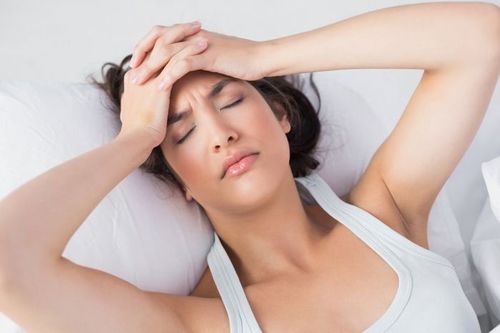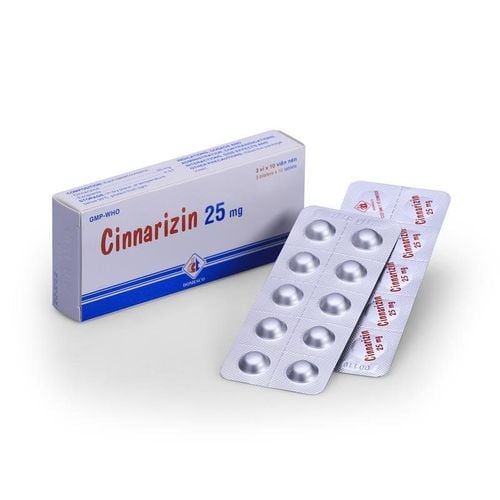This is an automatically translated article.
The article was professionally consulted with a Doctor of Medical Examination & Internal Medicine - Vinmec Central Park International General HospitalFrequent dizziness, lightheadedness, tinnitus, ... are symptoms of many health problems such as anemia, cardiovascular disease, neurological disease or psychological disorders. At this time, patients should go to the doctor for early diagnosis and timely treatment.
1. What is vertigo?
Dizziness is the sensation of moving or spinning in one's self or surroundings while the patient has no corresponding movements. In most cases, the dizziness subsides within a few minutes. However, if the dizziness occurs frequently, does not decrease or is accompanied by symptoms such as dizziness, ringing in the ears, headache, nausea, vomiting, ... then the patient should see a doctor.It is necessary to distinguish dizziness from dizziness, dizziness because there are different causes and treatments. Dizziness is a feeling of lightheadedness, dizziness, lightheadedness, unsteadiness or wobbling, but not the sensation of the body or the environment moving, spinning, or tipping over as in vertigo.
Trắc nghiệm: Bận rộn có ảnh hưởng đến sức khỏe của bạn không?
Cuộc sống hiện đại khiến chúng ta vì quá bận rộn mà quên chăm sóc sức khỏe cho chính mình. Ai cũng biết rằng lịch trình làm việc cả ngày có thể khiến bạn kiệt sức, nhưng cụ thể bận rộn ảnh hưởng thế nào tới sức khỏe? Hãy cùng làm thử bài trắc nghiệm dưới đây.
2. Dizziness and lightheadedness are just symptoms of many different diseases
Dizziness can be a symptom of such diseases as:Pathology of the vestibular cochlear nerve (8th nerve): There are many causes such as viral neuritis, degeneration, due to inflammation of the inner ear,... Vestibular dysfunction causes severe dizziness and lightheadedness, which may be accompanied by nausea, vomiting and pale skin; BPPV (Benign Paroxysmal Positional Vertigo) is a paroxysmal benign positional vertigo, caused by ectopic ear stone fragments in the semicircular canal system of the inner ear. These ear stones are small crystals of calcium carbonate. Common symptoms are dizziness, loss of balance and nausea, especially when getting up from bed. The main treatment of the disease is to adjust head and neck position, do procedures to move ear stones back to their original position (Epley, Simon, .. procedure), and practice some exercises to restore vestibular function. , use of vestibular inhibitors only has a supportive role. Meniere's disease (idiopathic fluid retention disease): The 40-50 year old group is more susceptible to Meniere's disease, the disease manifests itself as dizziness, tinnitus, hearing loss, pain in the ear, nausea,... Dizziness may last from 20 minutes to 4 hours. The disease occurs due to an imbalance of pressure between the internal and external fluids in the inner ear. The disease cannot be cured but can be controlled by using diuretics, reducing salt intake, abstaining from caffeinated foods such as coffee, tea, soda, etc. In some cases, surgery may be necessary.

Anemia: In people with anemia, the body is not supplied with enough hemoglobin, causing fatigue, dizziness, pain. head (if anemia is severe), pale. Anemia can be caused by a lack of nutrients in the diet for a long time, women with menorrhagia, people infected with worms,... Hypoglycemia: Low blood sugar can cause dizziness and lightheadedness. When this happens, the patient should quickly replenish sugar by drinking a glass of sugar water, eating a candy bar or a slice of bread. Stressful work: Dizziness can occur when the mind is stressed, having to concentrate on working with the computer for a long time. To prevent stress-induced dizziness, patients need to reduce their workload, avoid focusing too much on stress, exercise regularly, and reduce alcohol and stimulants such as coffee. Patients can practice meditation, practice deep breathing to reduce symptoms as well as improve quality of life Low blood pressure: Lightheadedness occurs when changing position from sitting or lying down to standing and decreases when lying with the head low . Dizziness due to low blood pressure is often accompanied by symptoms such as fatigue, shortness of breath when exercising, shortness of breath,... When blood pressure is low, blood will not be supplied enough to the brain, causing dizziness, lightheadedness, unsteady standing, stumbling,...If severe, it can cause fainting. Side effects of some drugs: Some drugs to treat heart disease, nerves, blood pressure,... can cause side effects like dizziness, lightheadedness, tinnitus. When this symptom occurs, the patient should notify the doctor to change the drug or take appropriate measures.
3. You should go to the doctor when you often have dizziness, lightheadedness, tinnitus
If the symptoms of dizziness, vertigo appear only transiently and then disappear, sometimes repeat, but the duration is short, unchanged, not accompanied by other signs such as double vision, slurred speech, numbness in the limbs. , headache, loss of consciousness, convulsions, ..... or not accompanied by systemic diseases such as cancer, fever, weight loss, anemia, cardiovascular disease, ... then the patient just needs to strengthen Get enough rest and nutrition. However, when the above symptoms appear frequently, change in nature, have signs of nerve damage or systemic diseases mentioned above, the patient needs to be alert because it is a manifestation of many diseases. dangerous conditions such as chronic anemia, severe atherosclerosis, cardiovascular and neurological diseases,... It's best if you see signs of prolonged instability, patients should go to a big hospital to get checked out. diagnose the disease, give in-depth advice on appropriate treatment methods to reverse the disease, avoid missing the best treatment opportunity.Regarding how to deal with sudden dizziness, the patient should find a place to rest, move gently, change position slowly, do not suddenly sit down or stand up because it will increase the risk of falling. How to prevent and treat symptoms of dizziness depends on each specific disease. However, symptoms can be prevented by maintaining a healthy lifestyle, exercising daily, avoiding stress, and getting proper rest.

Department of Medical Examination and Internal Medicine - Vinmec International General Hospital operates with a specialized function in examining and treatment of diseases related to the central nervous system (skull, meninges, brain, cerebrovascular, intracranial nerves, pituitary gland, spine, discs, spinal membranes) and nervous system peripheral (nerves and ganglia outside the brain and spinal cord).
Along with a team of leading doctors and professors with extensive experience in different fields, with dedication and love for the profession, the Department of Examination and Internal Medicine at Vinmec is always patient-centered, wants to bring the best medical care service to customers.
Please dial HOTLINE for more information or register for an appointment HERE. Download MyVinmec app to make appointments faster and to manage your bookings easily.













